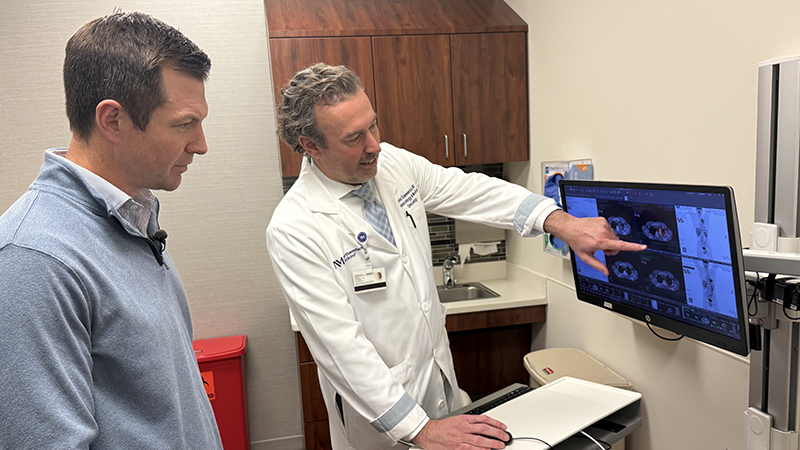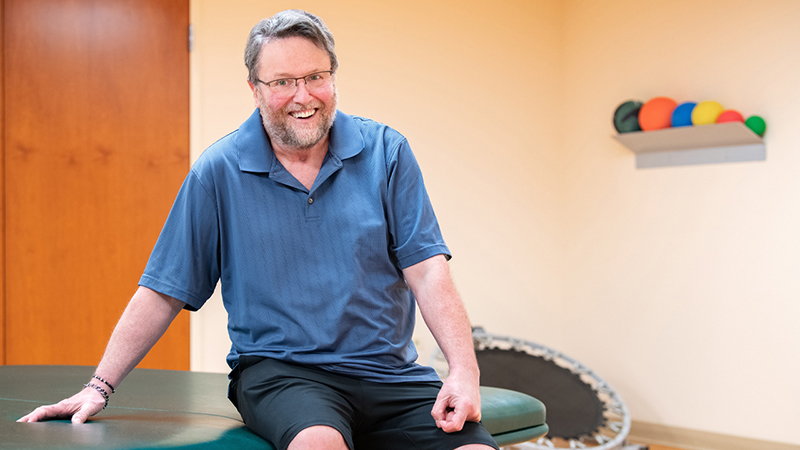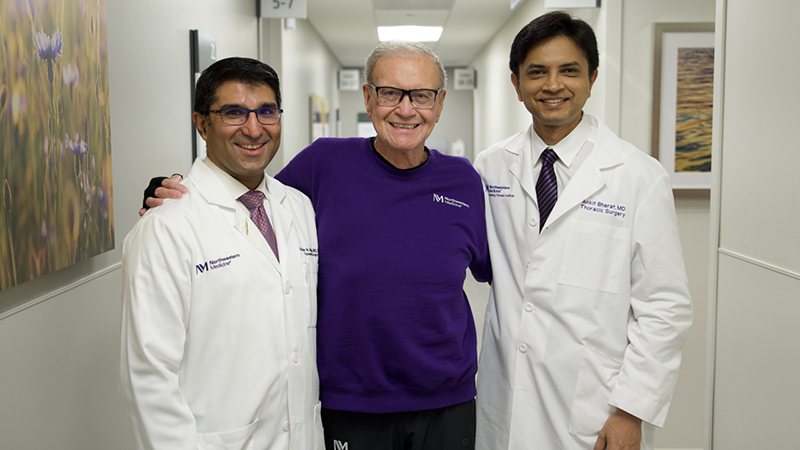Young Patient Receives Precision Treatment for Brain Tumor
Published July 2020
Proton Therapy Minimizes Damage
Thanks to a school vision screening, Blake’s physicians detected a rare brain tumor that would change the course of his life.
It was March, and Blake was like any other first grader, enjoying LEGO® building, Star Wars and playing with his little brother, Max. After an eye screening at school, Blake’s parents were told his left eye needed to be retested. This was alarming to Blake’s parents as Blake had just had his annual eye exam a few weeks prior.
Even though another, more detailed eye exam with the family optometrist didn’t raise any red flags, his parents knew something wasn’t right because Blake said he saw black spots when his right eye was covered. Blake’s parents pushed for additional testing and an appointment with an ophthalmologist.
A few days later, an MRI revealed a mass on Blake’s pituitary gland. The family was sent to the emergency department, where Blake had blood drawn and a CT scan, followed by another MRI the next morning. Blake’s family was told he had a benign tumor called craniopharyngioma, a rare type of tumor in children that grows near the pituitary gland at the base of the brain. His physicians said the tumor was something Blake was born with.
Less than two weeks after that vision screening at school, Blake underwent an almost eight-hour surgery at a children’s hospital near his home in Indianapolis. During the surgery, only a portion of the tumor was removed because surgeons were concerned about causing further damage to his pituitary gland and surrounding tissue, which could have impacted Blake’s ability to walk and talk.
“Going into surgery, we were told Blake might be in the hospital for a week or longer if he needed therapy. Thankfully, Blake did beautifully and did not require any extended therapies,” says his dad, Mark.
However, Blake would need radiation treatment to shrink the remaining pieces of the tumor. That’s when his parents first learned about Northwestern Medicine Proton Center.
Located in Warrenville, Illinois, about 30 miles west of Chicago, Northwestern Medicine Proton Center is the first and only proton therapy center of its kind in the state.
Proton therapy is a treatment option for some patients that can precisely target tumors while minimizing impact on surrounding tissues. Proton therapy uses heavy, positively charged atomic particles instead of the standard X-rays that are used in conventional radiation therapy. The protons can be controlled with greater precision to conform to the shape of the tumor.
After researching their options, Blake’s family felt Northwestern Medicine Proton Center offered the best course of treatment for their son.
“Blake’s neurosurgeon said this would be the right place for Blake. She was right,” says his mom, Darsi.
During their initial visit to Northwestern Medicine Proton Center, Blake and his family felt at ease with the friendly staff and healing environment. Blake and his parents received a one-on-one consultation with one of the radiation oncologists at the Proton Center plus multiple other physicians, nurses, and patient focused representatives.
Blake’s care team designed a treatment plan that would target the individual spots of the tumor with radiation through pencil beam scanning. The goal was to destroy what was left of the tumor without damaging surrounding healthy tissue, like Blake’s pituitary gland. With the treatment plan complete, Blake met with a radiation therapist to be sized for his customized treatment mask.
“Proton radiation is great for craniopharyngiomas and many other pediatric tumors because it reduces the amount of radiation that normal tissues are exposed to. It can improve long-term outcomes by decreasing the chances of side effects that could show up in the years and decades after the treatment is done,” says Stephen Mihalcik, MD, radiation oncologist at the center.
The family stayed at the Ronald McDonald House near Northwestern Medicine Central DuPage Hospital while in Illinois. For the next six weeks, Blake received daily radiation treatments, Monday through Friday. Blake didn’t need any sedation for the treatments, and he experienced no side effects. The family was able to schedule his radiation appointments early in the morning, leaving the rest of the day open to explore the Chicagoland area.
The family became friends with the staff and other patients receiving care at Northwestern Medicine Proton Center. The staff always had his audiobook ready for Blake to listen to during his treatment and took every effort to make Blake feel at ease. Every Friday, they rewarded both Blake and his little brother with a visit to the Treasure Box.
“When the six weeks were over, the boys didn’t want to go home. We were together as a family, spending quality time together during a scary time. They enjoyed the friends they had made at the center, and they enjoyed staying at the Ronald McDonald House. It speaks volumes to the level of care and attention we received,” recalls Mark.
“Aside from the scar on his head from surgery, you would never know what Blake has been through,” says Darsi.
Back at home in Indiana, Blake has regular MRIs and blood draws, and he continues to be monitored by his ophthalmologist, endocrinologist and neurosurgeon.
“Because of his care, ours is a happy story. We were a close family prior to Blake’s diagnosis, but everything we’ve been through has brought us that much closer. You never want anything bad to happen to your children, but the experiences we go through help shape us into the people we’re supposed to be,” says Darsi.
Because of his care, ours is a happy story.— Blake’s mom, Darsi





